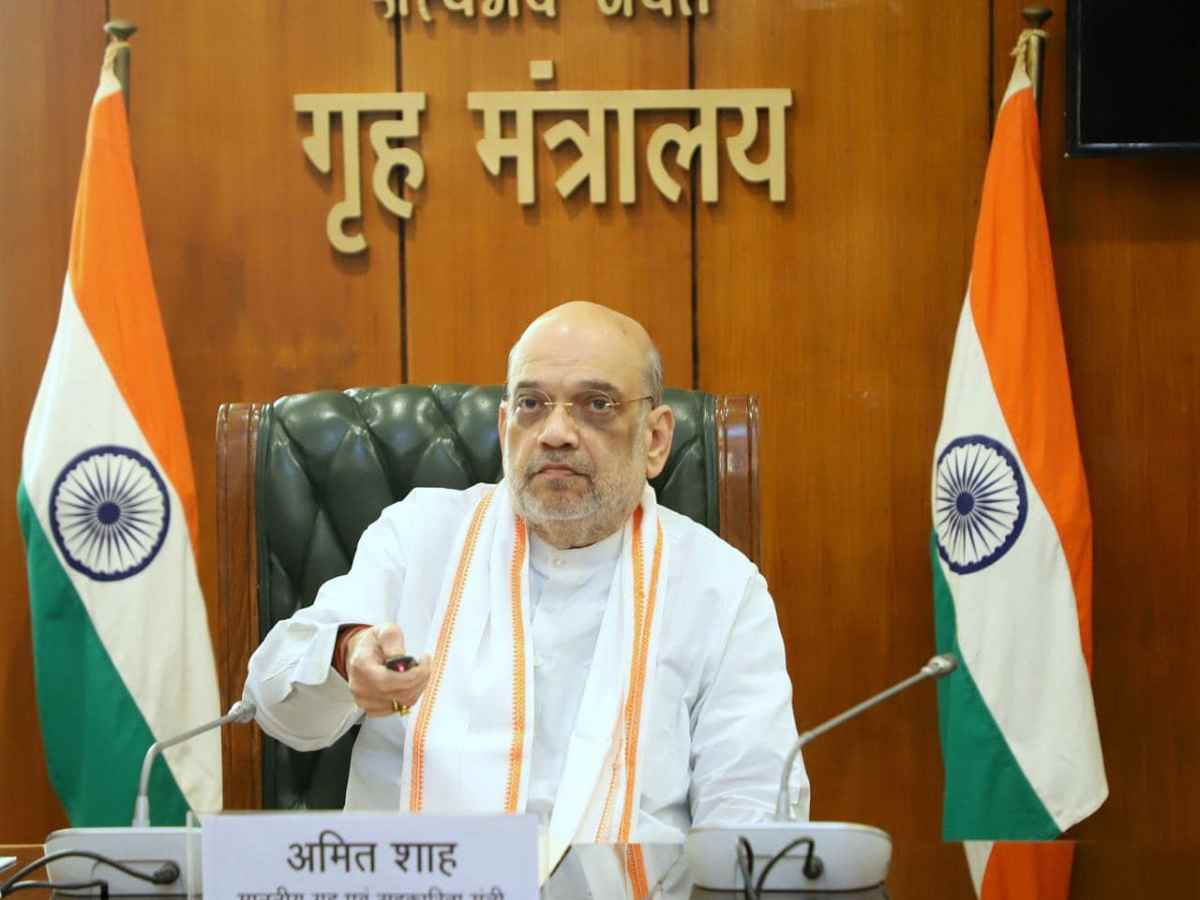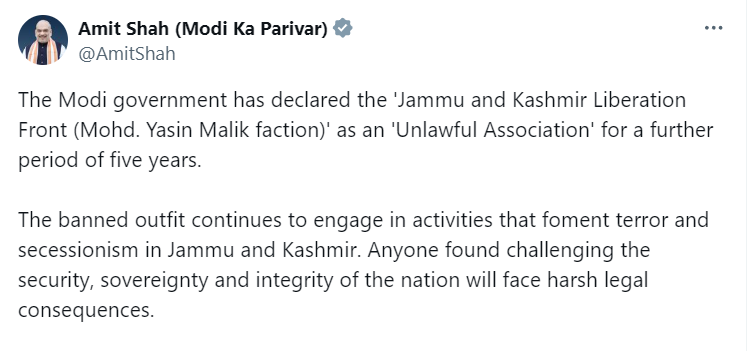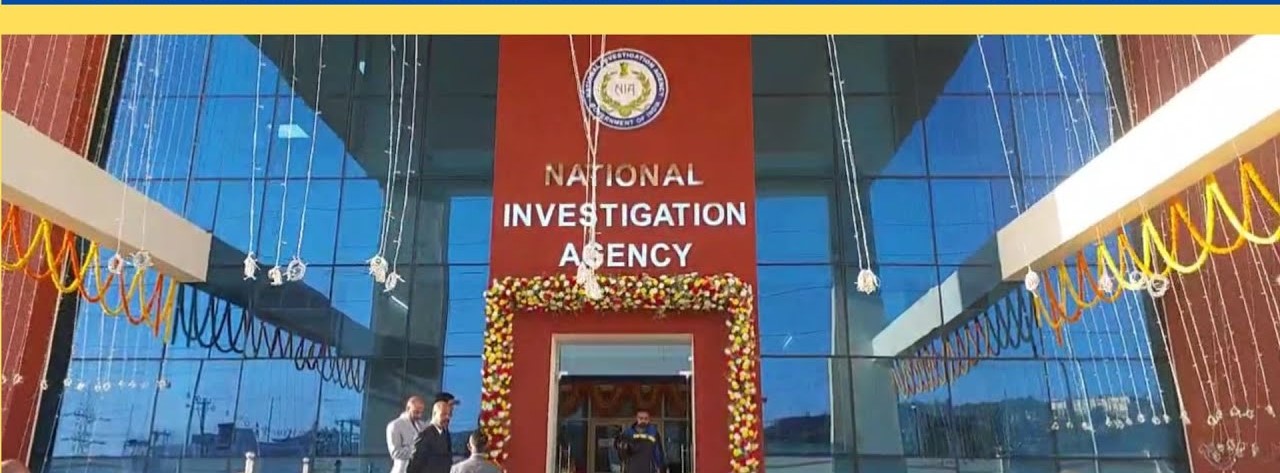The recent developments unfolded in the realm of counter-terrorism measures, with the Centre constituting the Unlawful Activities (Prevention) Tribunal to adjudicate on the status of the Jamaat-e-Islami, and other separatist organissations, as an ‘unlawful association’. This move underscores the government’s unwavering commitment to upholding national security, as reiterated by Union Home Minister Amit Shah, who emphasized the necessity of rooting out organizations posing threats to the nation’s sovereignty.
By Ajaz Rashid
In a significant stride towards bolstering India’s fight against terrorism and organized crime, Union Home Minister Amit Shah, in conjunction with Prime Minister Narendra Modi’s government, inaugurated the National Investigations Agency (NIA) offices in Jammu and Kochi, along with a residential complex in Raipur. The inauguration, conducted virtually from New Delhi, marked a pivotal moment in the nation’s security apparatus, emphasizing the government’s commitment to leveraging technology and robust infrastructure in combating threats.
“The Prime Minister Narendra Modi Government is powering its battle against terrorism with the sharp edge of technology and the facilities of robust infrastructure,” remarked Union Home Minister Amit Shah during the inauguration ceremony.
The cornerstone of this initiative lies in the introduction of a state-of-the-art digital Criminal Case Management System (CCMS) by the NIA. Designed to enhance coordination in terrorism and organized crime cases, the CCMS stands as a testament to the government’s proactive approach in adopting innovative solutions to address evolving security challenges.
“The newly developed CCMS will enable the NIA personnel to better coordinate in terrorism and organized crime cases, thereby improving justice delivery,” Shah explained, underlining the significance of the system.
The unveiling of the CCMS comes at a critical juncture as India grapples with escalating threats from various terrorist organizations and emerging challenges posed by advancements in technology.

“The launch of the software comes at a time when India is facing increasing threats from various terrorist organizations, new challenges in the form of extensive use of cyber-space, dark-web, drones, crowd-funding, use of crypto-currencies, encrypted communication platforms, besides use of new technologies for terrorist financing, movement of arms and other terror support activities,” highlighted a statement from the Ministry of Home Affairs.
Furthermore, Shah emphasized the pivotal role of the newly launched Sankalan mobile app, curated by the National Crime Records Bureau (NCRB), which serves as a comprehensive guide to navigate through new criminal laws.
“The App will work as a comprehensive guide for all stakeholders,” Shah elaborated, underlining the significance of the app in facilitating access to pertinent information for law enforcement agencies and other stakeholders.
The inauguration of modern NIA office complexes in Jammu, Kochi, and Raipur signifies a significant stride towards providing a secure and conducive environment for law enforcement personnel.
“These modern buildings will provide the NIA personnel with a secure and conducive environment for executing their work in a better way,” the Ministry of Home Affairs stated.
Counter-Terrorism and Law Enforcement Efforts
In tandem with these advancements, recent developments have unfolded in the realm of counter-terrorism measures. The Centre constituted the Unlawful Activities (Prevention) Tribunal, comprising a Delhi High Court judge, to adjudicate whether or not there is sufficient cause for declaring the Jamaat-e-Islami, Jammu and Kashmir (JeI) as an ‘unlawful association’. The Ministry of Home Affairs (MHA) issued a notification in this regard, emphasizing the government’s commitment to upholding national security.
“Jamaat-e-Islami, Jammu and Kashmir (JeI) has been declared as an unlawful association, vide notification dated February 27, 2024, published in the Gazette of India, Now, therefore, in exercise of the powers conferred by sub-section (1) of section 5 read with sub-section (1) of section 4 of the Unlawful Activities (Prevention) Act, 1967 (37 of 1967), the Central Government hereby constitutes the Unlawful Activities (Prevention) Tribunal consisting of Justice Navin Chawla, Judge, High Court of Delhi, for the purpose of adjudicating whether or not there is sufficient cause for declaring the Jamaat-e-Islami, Jammu and Kashmir (JeI) as unlawful association,” the notification reads.

Earlier, on February 27, the MHA extended the ban on Jamaat-e-Islami-J-K under the Unlawful Activities (Prevention) Act, 1967, for another five years. Union Home Minister Amit Shah reiterated the government’s policy of zero tolerance against terrorism and separatism, emphasizing the need to root out organizations posing threats to the nation’s security.
Taking to his official; X handle, Union Home Minister Amit Shah posted, “Pursuing Prime Minister Narendra Modi Ji’s policy of zero tolerance against terrorism and separatism, the government has extended the ban on Jamaat-e-Islami-Jammu Kashmir for five years.”
“The organisation is found continuing its activities against the security, integrity and sovereignty of the nation. The outfit was first declared an ‘Unlawful Association’ on February 28, 2019. Anyone threatening the security of the nation will face ruthless measures,” Shah added.
Furthermore, Muslim Conference J&K (Sumji faction) and Muslim Conference J&K (Bhat faction) were declared banned groups by the Ministry of Home Affairs on 28th February 2024. “Their activities were against the sovereignty and integrity of the nation,” stated Home Minister Amit Shah, reaffirming the government’s determination to combat terrorism and unlawful activities.
Taking on the X formerly Twitter Home Minister Amit Shah said, “Striking terror networks with undiminished vehemence the government has declared the Muslim Conference Jammu & Kashmir (Sumji faction) and Muslim Conference Jammu & Kashmir (Bhat faction) as Unlawful Associations.
“Their activities were against the sovereignty and integrity of the nation”, he posted on X.
Amit Shah further asserted that Prime Minister Narendra Modi led government is determined to uproot terrorism and anyone involved in unlawful activities will face dire consequences.
HM Declares Additional Unlawful Associations in J&K
The Union Home Minister, Amit Shah, on 16th March 16, 2024, announced that the ‘Jammu and Kashmir Liberation Front (Mohd. Yasin Malik faction)’ has been declared an ‘Unlawful Association’ by the Modi government for an extended period of five years. This decision stems from the outfit’s persistent engagement in activities that sow terror and secessionism in Jammu and Kashmir, with severe legal repercussions awaiting those who challenge national security.
Taking to X, Union Home Minsiter Amit Shah said, “The Modi government has declared the ‘Jammu and Kashmir Liberation Front (Mohd. Yasin Malik faction)’ as an ‘Unlawful Association’ for a further period of five years.
The banned outfit continues to engage in activities that foment terror and secessionism in Jammu and Kashmir. Anyone found challenging the security, sovereignty and integrity of the nation will face harsh legal consequences, he added.
“The Modi government has declared the ‘Jammu and Kashmir Liberation Front (Mohd. Yasin Malik faction)’ as an ‘Unlawful Association’ for a further period of five years.
The banned outfit continues to engage in activities that foment terror and secessionism in Jammu and Kashmir. Anyone found challenging the security, sovereignty and integrity of the nation will face harsh legal consequences”, Amit Shah Tweets.

Jammu and Kashmir Peoples Freedom League
Furthermore, Minister Amit Shah disclosed that the Jammu and Kashmir Peoples Freedom League has also been designated as an ‘Unlawful Association’ for five years. This organization poses a direct threat to India’s integrity by promoting, aiding, and abetting the secession of Jammu and Kashmir through acts of terrorism.
Designation of Four Factions
The Ministry of Home Affairs (MHA) has identified four factions of the Jammu and Kashmir Peoples League as ‘Unlawful Associations’. These factions, led by individuals such as Mukhtar Ahmed Waza, Bashir Ahmad Tota, Ghulam Mohammad Khan, and Aziz Sheikh under Yaqoob Sheikh’s leadership, have actively contributed to inciting terror and fomenting secessionism in Jammu and Kashmir, Amit Shah stated on X.
Law Enforcement Efforts
Law enforcement agencies in Jammu and Kashmir have undertaken relentless efforts to unveil terror networks and disrupt funding channels. Simultaneously, the NIA conducted extensive raids targeting terror funding networks associated with Jamaat-e-Islami, seizing substantial evidence to thwart their nefarious agendas. These operations reflect a concerted effort to disrupt and neutralize the terror funding networks operating in the region.
The Jammu Police also presented a comprehensive charge-sheet against two individuals, Abdul Waris and Masrat Hussain, in a terror case before the court of 3rd Additional Sessions Judge Jammu (NIA), highlighting the gravity of the findings and the necessity for due legal process.
Moreover, the National Investigation Agency (NIA) launched a widespread operation across Jammu and Kashmir to dismantle the terror funding network associated with the proscribed Jamaat-e-Islami (JeI). The raids yielded a significant haul of incriminating evidence, underscoring JeI’s persistent efforts to propagate extremist ideologies and finance violent agendas within Jammu and Kashmir.
In a relentless effort to dismantle terror networks and combat radicalization, the NIA executed a series of sweeping raids across Jammu and Kashmir, targeting individuals engaged in promoting terrorism and radical ideologies. These operations underscore the commitment of law enforcement agencies to safeguard communities and maintain peace and security in the region.
The recent charge sheet presented by the Special Investigation Unit (SIU) Shopian in the case surrounding the terrorist strike on local laborers in Shopian’s Gagran area during the summer of 2023 further reaffirms the resolve of law enforcement agencies to hold perpetrators accountable for their heinous deeds and ensure justice for the victims and their families.
History
The National Investigation Agency (NIA) in India is a specialized agency established by the Government of India to combat terrorism and other serious crimes. Here’s a brief history of the NIA:
Formation: The NIA was established on December 31, 2008, through the enactment of the National Investigation Agency Act 2008. It came into existence in the wake of the 2008 Mumbai attacks, which highlighted the need for a specialized agency to handle terrorism-related cases efficiently.
Mandate: The primary mandate of the NIA is to investigate and prosecute offenses affecting the sovereignty, security, and integrity of India, including terrorist activities, smuggling of arms and explosives, human trafficking, counterfeit currency, and cyber-terrorism.
Powers: The NIA has been vested with extensive powers to investigate and prosecute cases across India without seeking permission from the states concerned. This allows for a more centralized and effective approach to combating terrorism and other transnational crimes.
Leadership: The agency is headed by a Director-General who is an officer of the Indian Police Service (IPS) or an officer from the Indian Revenue Service (IRS) with the rank of Director-General of Police.
Key Investigations: Since its inception, the NIA has handled several high-profile cases, including the 2008 Mumbai attacks, the 2016 Pathankot attack, the 2019 Pulwama attack, and various cases related to insurgent groups in India’s northeastern states.
International Cooperation: The NIA collaborates with law enforcement agencies and intelligence agencies worldwide to gather intelligence, share information, and coordinate efforts to combat terrorism and transnational crimes.
Expanding Role: Over the years, the scope of the NIA’s work has expanded beyond terrorism to include other serious offenses that pose a threat to national security. This includes cases related to organized crime, drug trafficking, and arms smuggling.
Legislative Amendments: The NIA Act has been amended over time to strengthen the agency’s powers and capabilities. For example, in 2019, the NIA Act was amended to allow the agency to designate an individual as a terrorist and seize their properties.
The National Investigation Agency plays a crucial role in safeguarding India’s national security and combating various forms of organized crime. It continues to evolve and adapt to emerging threats to ensure the safety and security of the nation.

Leave a Reply